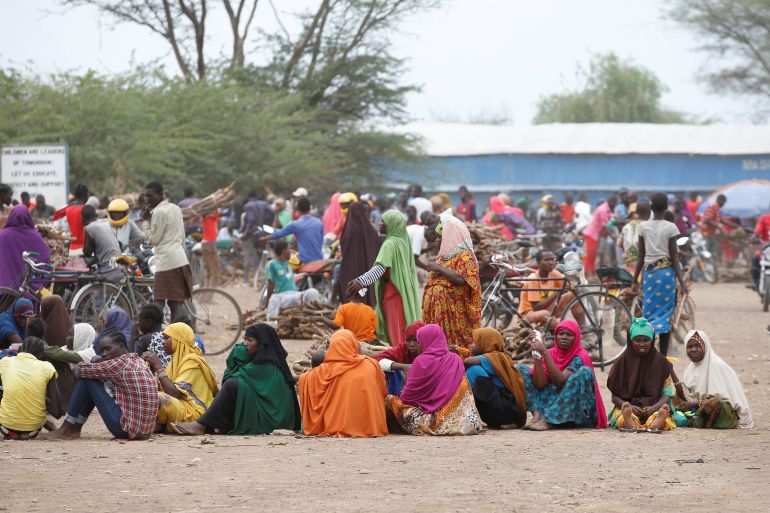Report calls for comprehensive policy before integrating refugees in Kenya

The country is seeking to seal gaps that may deter a smooth integration during the first four-year transition phase.
A new report that examined the ongoing implementation of the Refugee Act 2021, which allows for the transition of refugee camps into integrated settlements, has identified gaps that need to be filled in order to allow for a smooth integration of refugees into society.
The report titled "Transforming Refugee Policy in Kenya; From Encampment to Socio-Economic Integration" and co-produced by the Kenya National Commission on Human Rights (KNCHR) and Refugees International, delves into the challenges and opportunities in advancing the rights and socio-economic integration of refugees and host communities.
More To Read
- IGAD ministers renew regional pact on refugees as Kenya demands fair burden‑sharing
- One dead, two officers injured as protests rock Kakuma refugee camp
- Refugees win big as High Court orders citizenship, immigration law reforms
- Kenya commits to Shirika Plan on World Refugee Day amid mounting refugee hunger crisis
- New refugee management curriculum to boost local capacity in Turkana, Garissa counties
- Refugees in Kenya to access SIM cards, mobile money under new regulations
As the country prepares for the integration of refugees into host communities under the Shirika Plan, the country is seeking to seal gaps that may deter a smooth integration during the first four-year transition phase.
The idea to close the camps was informed by national security concerns, with the government noting that the presence of Al-Shabaab terror group was turning them into security threats.
The report notes that the plans had been shelved since 1992 when the first threat of closure was made, repeated in 2016, then in 2019 and lastly in 2021 when the Refugee Act was drafted.
With the Act in place and its accompanying regulations, the Shirika Plan was established to actualise the law that seeks to shift the current refugee policy from camps and settlements to integrated communities that ensure they are self-reliant ending their decades-long reliance on aid.
Refugees struggling
According to the report, refugees are currently struggling with food insecurity, access to education, overstretched healthcare facilities, insecurity and severely restricted employment opportunities which would be compounded if certain gaps are not addressed ahead of the transition.
Speaking during its launch at the University of Nairobi, KNHRC CEO Bernard Mogesa said the research revealed that with the existing restrictions on their right to work, refugees are likely to struggle with being self-reliant, especially against the backdrop of poverty in their host communities.
Turkana ranks as the poorest country in the country, with 88 per cent of the population living below the poverty level, while in Garissa, 68 per cent of the population is classified as poor with only 32 per cent having access to safe water.
"Therefore, the socioeconomic integration of refugees in regions where the population is already dealing with myriad deep-rooted historic socio-economic marginalisation will be an uphill task unless the donors invest significantly in infrastructure, human capital, and technology," the report notes.
Consequently, substantial funding is needed to address decades of neglect in infrastructure and services in refugee-hosting regions.
Department of Refugee Affairs
It also calls for the Department of Refugee Affairs to be elevated into a semi-autonomous government agency with direct funding from the Treasury to ensure effective functioning.
The report further notes that the current approach to integration focuses narrowly on social and economic integration, neglecting full assimilation and naturalisation as the Refugee Act 2021 does not clarify how housing rights will be achieved, land owned, existing inadequate infrastructure and the issue of taxation.
"The Refugee Act 2021, faces significant gaps, particularly regarding clarity on land rights and freedom of movement. The law is vague in critical areas, leading to confusion in implementation," said Dr Mogesa, noting the need for a comprehensive refugee policy to seal the gaps and clarify roles among national and host counties to ensure effective coordination and support.
At the moment, Somali nationals comprise a majority of the refugee population in the country, accounting for 53 per cent of the total refugee population, followed by South Sudan at 24 per cent and the Democratic Republic of Congo (DRC).
The rest are spread across Ethiopia, Burundi, Uganda, Yemen and Sudan.
The report further recommends that the refugee identity system be harmonised to ease access to services and reduce fraud.
"The Department of Refugee Services and the UN Refugee Agency (UNHCR) should clear the backlog of unregistered refugees as a priority to safeguard refugees' dignity and ensure they can access protection and other services, including food rations," the report notes.
It also stresses the need to ensure that refugees only require one document to access the services they are entitled to under the Refugee Act 2021.
The Act further grants refugees the right to freedom of movement within designated areas, own property, work, access government services via the e-citizen, and education. However, concerns about their freedom of movement still persist.
"Concerns on free movement would be addressed and find accommodation once the new database is in place and linked to a new look refugee ID with a chip for cross-referencing of databases to ensure security, integrity, confidentiality and efficiency and service delivery and self–reliance and empowerment pathways for refugees," Mr John Burugu, the Commissioner for Refugee Affairs, said.
The new ID will allow the refugees to be hosted under a new database that will have interoperability with all refugee supporting agencies and on-board to the integrated population register master database to allow access to the e-citizen platform.
The report notes that the Shirika Plan must ensure the safe integration of the refugees within the host communities, return to the country of origin or resettlement in a third country as they are the primary durable solutions to refugee crises.
Top Stories Today













































